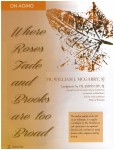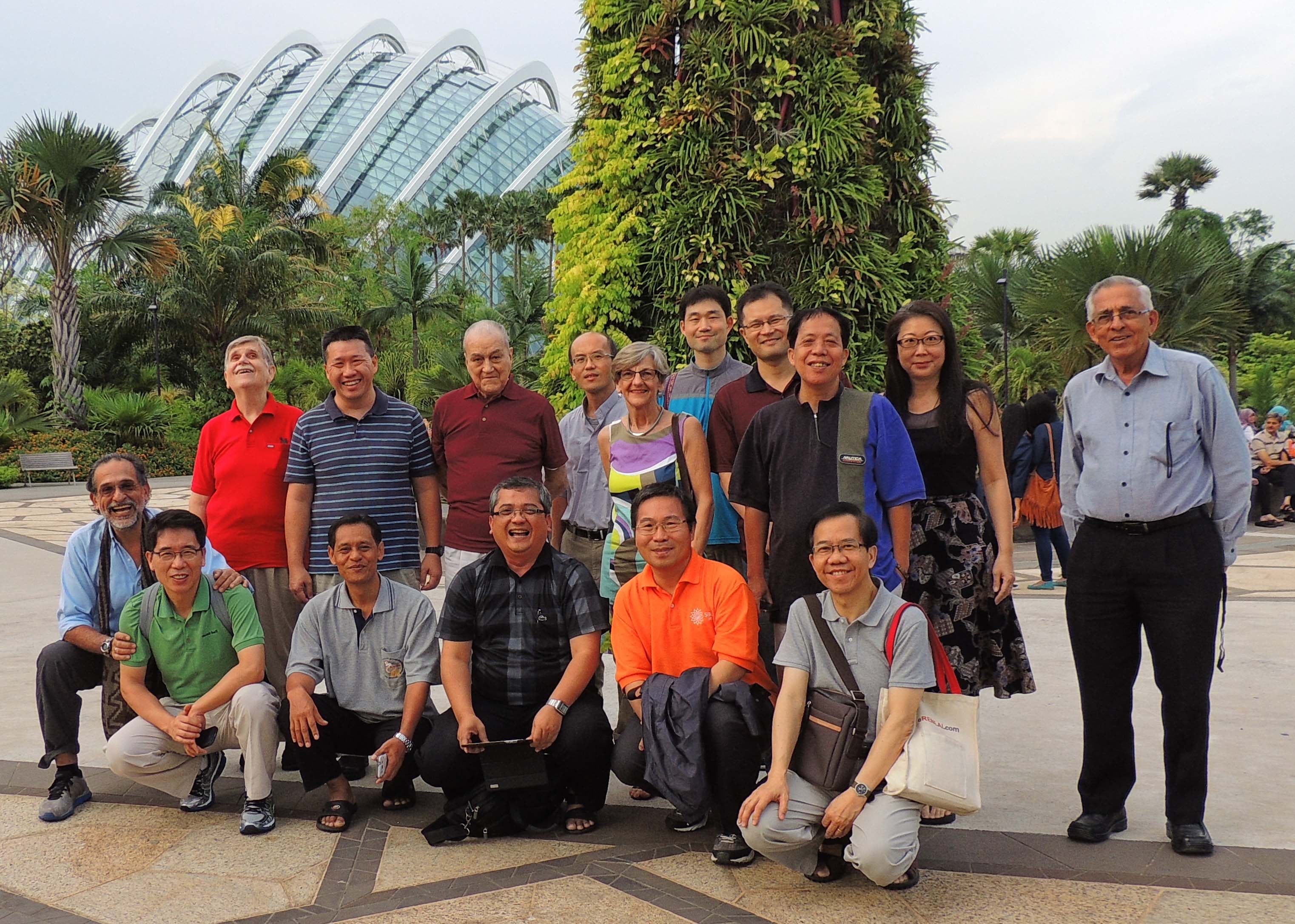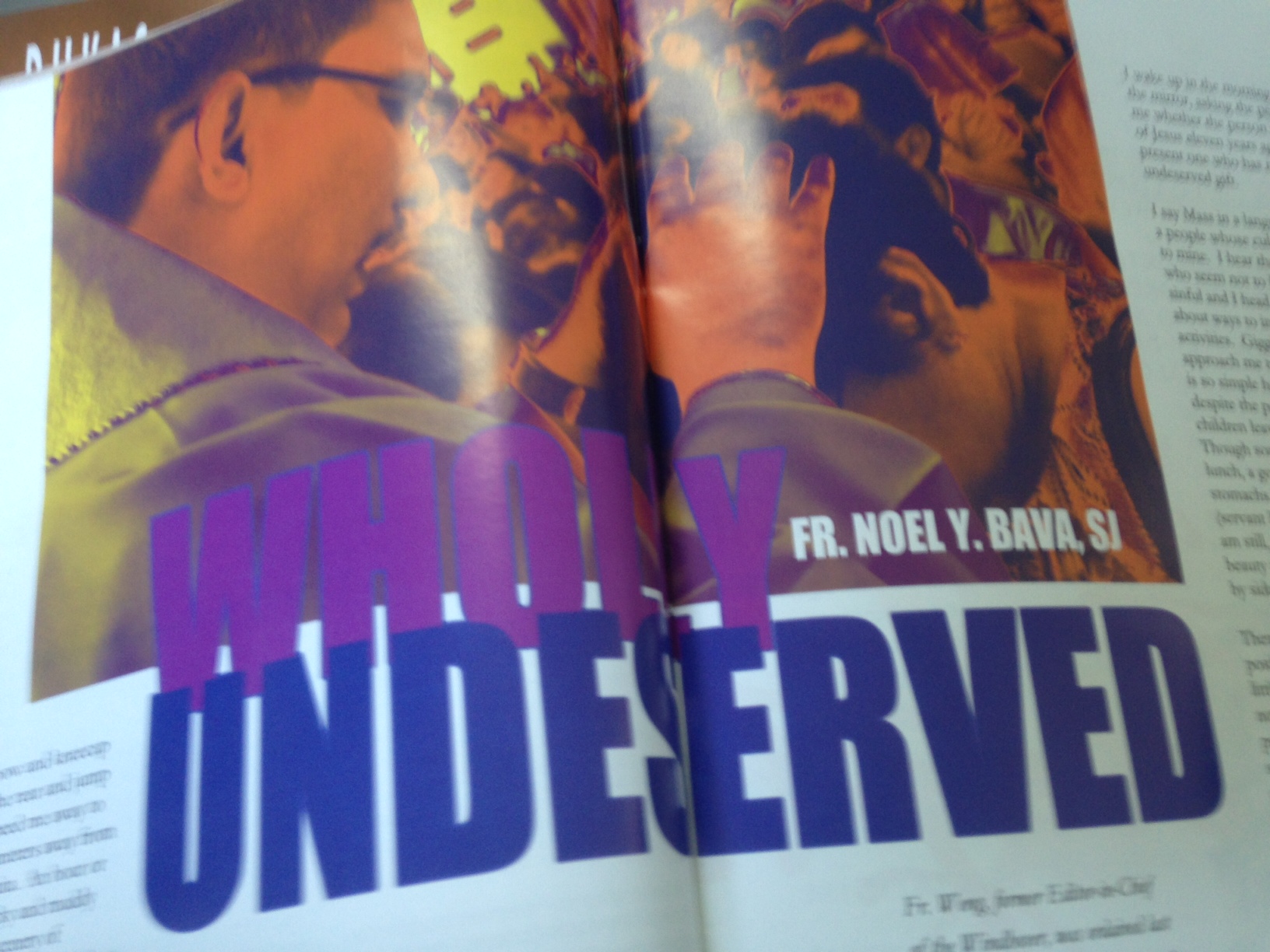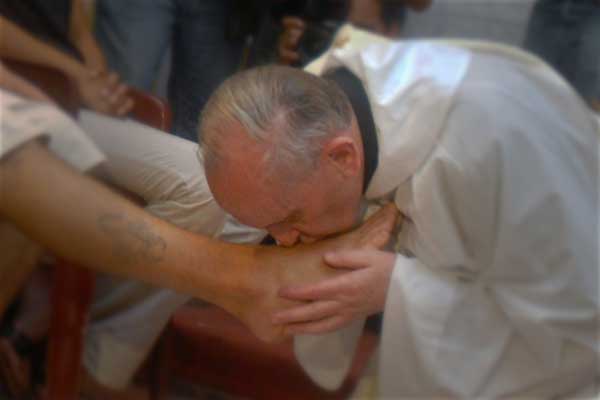
Fr. Bill will turn 87 on February 15 and continues to be spiritual director and confessor to Jesuits, other religious and lay friends. This article appeared in the Windhover, year XVI, Volume 1, 2014.
What am I doing in the Lucas Infirmary? To be succinct, Father Minister asked me if I had given any thought to moving in to the infirmary and said that Superiors were asking this question. I asked for a day to think about it. (Some like to say “pray over it,” but this would be presumptuous for someone like me.) I asked for that day because I was quite conscious of my reluctance which sprung and springs from the realization that this is most likely my last assignment. I knew that the room to which I would be assigned would be my last room. This would be my last assignment.
Yes, I see it as an assignment. People have sometimes recoiled at my speaking of my own death but I think we should be realistic. I’m 84. Not to recoil, but face. So yes, when I told the Minister ok, I was saying that the time has come for me to get ready for death.
Why should death cause much reluctance even to those with faith/hope. You see I love the beauty I’ve seen and heard. That beauty is for me summed up in rose-lipped friends and light-foot lads. There’s more beauty than that but the lads and maids sum it up. Tremendous beauty which I find it hard to say goodbye to. Some day I’ll remember to ask a Shakespeare specialist who “thou” is in the line, “to love that well which thou must leave ere long.” Never to see rose-lipped maidens and light-foot lads again? Take death lightly? “Tut tut” away if your faith is facile. I have fears that I may cease to be.
Of course there is something like fear and shame when I think of meeting the very Lord I want to meet. He can’t be ignorant of my infidelities. Yes, I hope he has forgiven but in the gut there remains this other aspect of death-reluctance. I believe that the Lord is “God and not a mortal” but I haven’t really met him yet. I believe in his compassionate forgiveness but this is belief, not knowledge, much less a knowledge that flows over into the gut. It’s good to keep repeating, “Lord, I believe. Help my unbelief!”
Ever Ancient, Ever New
Is all this too heavy and pessimistic? Of course, but that’s part of being a gael. Mixed with all this is a certain excitement. Augustine speaks of God as “beauty, ever ancient, ever new.” And leads me to look forward to gazing at and possessing unalloyed beauty, the one who really sums up all the beauty I see and hear and feel. For this reason my attitude towards death has changed and is now seen as the passage to a new sort of life.
Some of my thoughts of death are morbid but at base there’s nothing morbid about looking forward to beauty ever ancient, ever new. Recommended is the 13th chapter of Wisdom. What hinders a whole-hearted desire for death is the fact that the things we see are indeed beautiful and we don’t want to leave them. No wonder there’s reluctance to moving to Lucas if death is seen as the loss of the beauty we prize. Thank God there is the expectation, the longing, the excitement in the belief that there is no real farewell to beauty in death. It only seems that way. “…the things that are seen are beautiful.” Moving to Lucas and beyond is not so bad after all.
Diminishment
A few words about diminishment. In the building which housed the Philosophers at St. Louis University in Missouri, the Scholastics had a reference library which was taken care of by a Father McInerney. Father McInerney had a large sign on the wall of that library in Milwaukee English. It’s been hard to forget. One simple sentence, “Ve gets too soon old and too late schmart.”
They tried to teach us wisdom at St. Louis. I suppose most people “paint (their) outward walls so costly gay.” Some things take long to learn. What you are is more important than what you do. We are all more valuable than what we do. But this is hard to learn. God gives us the gift of diminishment so that we can laugh at our folly. We need to come to the realization that there is much beauty in bare ruined branches, dying embers, twilights and sunsets. Diminishment leads us to look for this beauty not just in the flashes of what is produced but in the producer. Then we learn not to paint the outward walls so much as the inner rooms.
It takes a while for us to allow others to hold us so we won’t fall, finally realizing that there is a good chance that old legs will not do the job. Diminishment of mind and body can teach us to get schmart and leave behind much of our convictions of over self-confidence or self-importance. Diminishment has its painful moments but it is also a great gift, a great teacher. It really is refreshing to see the giants of old chuckling at their own silliness and new-found incompetence. And it is good for us to cease to be afraid to drown an eye unused to flow. A good prayer is, “Lord, give me tears of compassion for others. It’s too late for hiding tears.”
Changed, not taken away
Most of the rest of this paper will be on Jesuit life for the aging and aged. Let me hang it all on contemplation, community, apostolate and then poverty, chastity and obedience – the six components of Jesuit life. Jesuit life is changed, not taken away.
Since the next faze of our life will be lived in the ecstasy of gazing at and possessing “beauty ever ancient, ever new,” old age seems like a good time for the transition. The heads of us old men don’t always function well but we can look at sunsets, smell flowers, feel the breezes, taste wines, thrill to music as we look forward to beauty ever ancient, ever new believing in where it all comes from.
We Jesuits are called to be contemplatives. It doesn’t have to be unpleasant contemplation or too heady. Is it too much to ask for a little more prayer? We can spend lots of time remembering in prayerful petition past and present friends and apostolates. And we can pray for and with the other bare ruin choirs we’re living with. Chances of hearing sweet birds sing are not great but whatever value that mysterious petitionary prayer, it still seems to draw us. Of course, all this is impossible if one sees one’s self as one of the great sources of light and life which superiors foolishly removed from the front lines. Yes, it all calls for letting go. Someone asked if Father Arrupe in his well-received letter intended that apostolate be prayerful or that prayer be apostolic. Neither really. He was concerned with the compenetration of both. But the stress here is that our prayer will always have to be apostolic.
Community Life in Old Age
So Jesuit life is not abandoned in diminished old age. It just takes somewhat new forms or emphases. Let’s look at community. As always we will want to build people up, to support them. Here we have an opportunity. We’re living with a group some of whom may need a lot of support. Maybe this internal apostolate will involve more laughter. We bring good news and reasons to laugh (or smile, or grin or at least a cheerful smirk.) Are not our friends in the Lord (or brothers) objects of our apostolate? Are they any less humans loved by God and any less in need of hope than the subjects of our apostolate? Why the discrimination? Someone has said that the members of our communities are our first apostolate.
In a very kindly way I was told by the Minister that I would be free to take many meals in the main refectory. I still greatly appreciate that. However, I should not allow myself to leave my wheelchair platoon too often. One has to be there. Of course, some escape is not a bad idea. But in health and sickness or dying one has to aim at some self-forgetfulness for the sake of others. By the way, ”This seeing the sick endears them to us. Us too it endears.” Or maybe should.
One bit of self-denial that has to be practiced by me is the restraining myself from green jokes. They need an audience that enjoys them. One of our numbers goes from one man to another to ask who our professors were at Woodstock. (Six or seven of the Lucans did time there in the Maryland countryside.) It’s a reminder that far beyond Woodstock we Jesuits have much in common indeed. I find myself reciting to myself: “We clamb the hill thegither,(John)… Now we maun totter down, John, but hand in hand we’ll go, and sleep thegither at the foot, John Anderson my Jo.” Let’s look again later at how community and apostolate should not be seen as far apart. How strange if we feed the beggar at the door but not our house mates.
Continuing Service
And so, to the third essential of Jesuit life, the one that should color them all. I strongly urge the reading of numbers 272 (about illness) and 595 (about dying) where it is clear that aging, sickness, diminishment and the final days of any Jesuit are to be a preaching of the word, an apostolate. I strongly urge letting go but I see that central to our life is apostolic service. Father Higinio Berganza, a Basque Jesuit who spent most of his life on Pohnpei in Micronesia, once came to the superior speaking about his diminished strength and asked to be assigned now to the “ministerium passivum,” a life of weakness, prayer and perhaps suffering. After some conversation the superior gave him that apostolic mission but added that he should be sure to keep going to visit the sick in the hospital until he could no longer do so. After all he was only about 80.
Should all give up all work as they pass a specific age? Why in the world would they? The thirty-five year old Jesuit should be involved in the ministerium passivum and activum but mostly in the active. The man in his 80s might well spend most of his time in the passivum but not all if he still has some strength. This will disappoint those who want precise dates for “retirement”. Virtue is in the middle somewhere. Some work and some withdrawal from work. It depends on the individual. Hopefully he will listen to his friends and superiors so that he may “let go” when the time has come. He may retire in some cases from forms of ministry but all his life will be an apostolate even for us who are senile. We still smile at our fellow infirmary inmates. We take seriously praying for the church and the society. Our fellow sick are still our apostolate.
I wonder if it is always clear to our men that their moving over or out can consist in great apostolic service. I also wonder if it is clear that there is nothing particularly pious about unexamined hard work or being in the way. No one is saying here that all work must stop but it may be reduced or the form may change. God does not exact day labor light denied. He may call for labor, but not the labor of a blind surgeon.
I would recommend some projects involving apostolic things that a man can do. I would be grateful to Pina and Liza* who call me for light work. Maybe we should look for other Pinas and Lizas besides, but always people who know our limitations. In it all, make sure there’s laughter at least no glumness. After all we remain apostolic men and men who are at least somewhat excited about the coming meeting with beauty ever ancient, ever new.
Poverty, Chastity and Obedience for the Diminishing
The living of poverty seems difficult for some men but it becomes easier for the diminishing. Once a man decides to let go, he has nothing. He is no longer holding on to his empires and treasures. He loves his body (at least as it was), his memory, his intellect but we can hope that he has learned to let them slide away in the Lord’s good time. He has memories of great accomplishments but he may have learned not to be a laudator temporis acti. He has had many little deaths in the past. Maybe moving into Lucas is another one. Maybe he’ll get good at dying with enough practice. Some might be sufficiently embarrassed by having the health care of the wealthy but let the embarrassment lead to trying to save the money of the Society and the poor as much as possible and allowed. I know a man who has been required to give up a cherished life’s work when he has lots of energy for a superior job. This is the kind of poverty I have in mind here.
Then there is chastity. This is a time for being more loving and for increased availability to people. Some loneliness? Of course. The 40 year-old celibate feels this as much as the 80 year-old one. No need to be a D.O.M. but encouragement of the young might be one’s big contribution in old age. It might be good for the wrinkled to tell young Jesuits not to give their heart away. “Tis paid with sighs a plenty and sold for endless rue.” And tell them that they don’t have a license to break the heart of another. There will be “time” for gazing at and possessing beauty ever ancient, ever new.
Obedience is now more to doctors, nurses and care-givers than to superiors looking for men to send on mission. But it’s the same obedience. You who are getting older or more sickly, please realize that superiors have a hard job. Resolve not to make it harder by resisting the assignment to the infirmary. I say assignment and I mean it. All of our assignments should be taken with a certain joy or something like that. Don’t do as I did. Don’t wait until you’re told. Listen, ask. Be available for this mission. Get out of the way. Don’t hold on.
We say we don’t want to be put on the shelf but there really is no shelf. We remain men on a mission. There is work to do. So, in the aged or diminished Jesuit life is not taken away but only changes.
This paper was requested by Fr. Jose Quilongquilong, Rector of Loyola House of Studies. I have a feeling that this is not exactly what he wanted. As I look over it, it is too autobiographical. At the same time a sociological, psychological, theological approach would be beyond me. I am limited to my experience. Joe Q doesn’t know of my allergy to writing.
——————-



